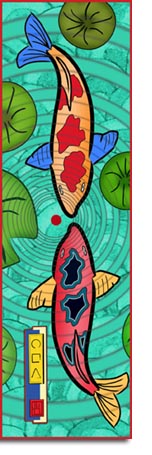On The Way: The Daily Zen Journal
Anthology on the Cultivation of Realization
Author unknown, Ming Dynasty 1368-1644
Learning is the journey to the Way. The classics of the sages and traditions of the wise are the tickets for the journey. In later generations false teaching became very prevalent. Do their words and actions actually accord with the classics of the sages and the traditions of the wise? If there is any inconsistency, then it is deluded teaching.
Learning the Way is not simply a matter of articulating it, or even just understanding it. It is absolutely necessary to sweep your own heart clean of all desires for things; then you will spontaneously harmonize with the Way.
The will to learn the Way should be all the firmer if you are older. If your mind is driven by ambient energies or taken away by external things, it is not the fault of these energies or these things, but affliction resulting from failure of intention.
Just examine your mind critically; reflect over and over, and you will see where the problem is. Put a stop to the mind with intense determination, and you will be a changed person.
What cannot be accomplished if you do it in deadly earnest? The mind of sages is the same as that of other people; how could it be only a matter of constant clarity and calm? It is nothing but seeing reality and developing stability.
When you see reality, no illusions can confuse you; when you develop stability, things cannot shake it or take it away.
Self Examination
Self-examination means examining your own mind. Of the twenty-four hours of the day, how much time does your mind remain inside, and how much of the time is it outside? If you do this for a long time you will naturally attain some power of practice.
In olden times there was a man who used black and white beans to make a record of his self-examination of mind. Whenever he had a good thought, he would put a white bean in a bowl; whenever he had a bad thought, he would put a black bean in a bowl. At first, there would be mostly black beans. Later the black and white would be half and half. Eventually there were mostly white beans, then nothing but white beans. Ultimately there would not even be any white beans.
There is something to this method, clumsy as it is. Self-examination means awareness and control. It is none other than reforming faults and consciously developing. It is none other than mastering seriousness. Even though the Great Way has no practice and no realization, materialism must be polished away day by day.
People have but one mind. When you want it to stay inside, whose mind is this? When it suddenly runs outside, whose mind is this? When you can discern clearly, then you can make progress at cultivation.
Self-examination ought to be thorough and precise. Self-government ought to be effective and decisive. Conscious development ought to be easy going and unhurried. These three exercises should be done every day until you  reach the point of effortlessness; then they are accomplished.
reach the point of effortlessness; then they are accomplished.
Some say we can transcend immediately to the beyond without having to make any effort. This might occur among those with higher knowledge, but I would dare say that not everyone can do it.
Self-Government
A sage said: “In learning, you increase daily; for the Way, you decrease daily.” This “decrease” means decreasing excess to attain centered balance, decreasing trivialities to return to basics, and reducing human desires to return to celestial design.
There may be a hundred human desires, but it is imperative to master oneself first. Mastering your self is like overcoming an enemy; first you must know where the enemy is before you can send in your troups.
Self-government is a matter of getting rid of what was originally not in us. Conscious development is a matter of preserving what is originally in us.
The human mind is very lively; the spirit should be peaceful. Its nature should be developed in accordance with its potential, not allowing heedlessness, or forcefulness, or interruption. There are the minimum requirements for what could be called guidelines for developing the mind.
What Confucius called “stopping at the highest good” is Lao-tzu’s “seeming to be there” and Buddha’s “seeing independently.” The spirit of a human being is in the mind, while the trigger of the mind is in the eyes. When the eyes are used inwardly, the mind is accordingly inside; hence the term “seeing independently.”
Seeing means looking inwardly; independently refers to independence of mind. If you look inwardly for a long time, not only will your mind be present, your mind will ultimately stabilize.
The Mind Scripture says, “I have seen the mind and attained the Way for infinite eons.”
Look upon past phenomena as dreamlike, present phenomena as lightning-swift, and future phenomena as completely obscure. Also look upon all contrived phenomena in the world as changing from moment to moment, troublesome to no end, and to be put at a distance as soon as possible.
Whatever you may be doing, you should practice both stopping and seeing. Stopping is silent calm; seeing is alert awareness.
Some ask what the clear mind is. The empty mind is the clear mind. This clear mind has no images of self, person, being, or liver of life; all things are empty.
Author unknown, Ming Dynasty 1368-1644
Excerpted from Taoist Meditation – Methods for Cultivation a Healthy Mind and Body Translated by Thomas Cleary 2000




The world is constantly drawing our attention outward. Meditation helps us to return, to turn the attention within again. Like a sheet of paper folded back onto itself, so the mind returns to being just as it is for awhile.
In this piece above by an unknown Taoist author we find numerous lines of advice, practical ways into a life of practice. With any reading of the Way, however, it is only real after we implement it ourselves. Are these principles true? Experimenting in the crucible of your own life is the only way to find out.
Create some time each day to pause. Carve out a resting place, a rock to sit on where the mountains of your mind extend as far as you can see. Then bring the attention back within and see for yourself what the mind is.
Attentively Here,
Elana, Scribe for Daily Zen